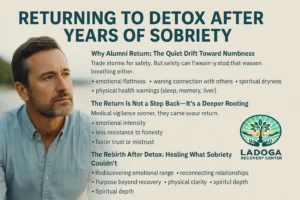You’ve walked years in recovery. You know the meetings, the routines, the “I am grateful” mornings. And yet somewhere along the path, you found yourself hollow. You’re sober—but muted. You’re present—but distant.
A few alumni who chose to return to alcohol detox at Ladoga Recovery Center told us what it felt like: “I was surviving sobriety, not living it.” They came back—not because they fell off completely, but because something inside asked: What else is possible?
This is their story. And maybe it’s yours, too.
Why Alumni Return: The Quiet Drift Toward Numbness
When you’ve carried sobriety for years, danger doesn’t always shout. It whispers.
You trade storms for safety. But safety can become stagnation.
You stop feeling joy the way you used to. You stop feeling pain either. You stop pushing boundaries, stop risking vulnerability.
You begin to shrink your world to what’s safe.
One alum said, “I wasn’t drinking, but I wasn’t breathing either.” Detox doesn’t only fix substance — it chases numbness out of hiding.
Returning detox became their answer to:
- emotional flatness
- waning connection with others
- spiritual dryness
- physical health warnings (sleep, memory, liver)
- feeling like a guest in your own life
They didn’t return to erase sobriety. They returned to reinstate aliveness.
The Return Is Not a Step Back — It’s a Deeper Rooting
Coming back to detox after years sober can feel like failure. It’s not.
It’s like planting perennials again after seasons of frost. You’ve lived. You know winter. You know what withered you. Now you return to till the soil, to replant deeper, stronger.
The years of sobriety don’t vanish. They inform your return. You bring insight, scars, wisdom, humility. You return with knowledge of triggers, patterns, and what truly matters.
You aren’t starting over. You’re starting from a richer place.
What Returning Detox Practically Looks Like
When alumni come back, detox looks familiar—but it’s also different.
- Medical vigilance sooner: they catch withdrawal signs earlier because their body remembers.
- Emotional intensity: years of avoided grief or shame can surface fast.
- Less resistance to honesty: they’ve been there, so they may be more willing to say the things they hid.
- Faster trust or mistrust: they know how trauma feels, so boundaries open and close more sharply.
- More pressing questions: who am I now? What is this life beyond sobriety?
One alum shared: “When I returned, I spent a week just feeling what I’d ignored for a decade.”
Detox this time was quieter, more internal. But the repair ran deeper.

The Rebirth After Detox: Healing What Sobriety Couldn’t
Detox opens the door. But what happens after is where the real rebirth lies.
Rediscovering Emotional Range
Some alumni return because parts of them died in long abstinence. The anger, the longing, the dreams—they dulled. Healing means reactivating emotional bandwidth. You re-learn how to cry, how to laugh, how to feel everything in between.
Reconnecting Relationships
Over time, relationships adapt to the sober you—but sometimes they never fully catch up. Returning detox helps dislodge old patterns. You renegotiate closeness, boundaries, forgiveness.
Purpose Beyond Recovery
Many long-term alumni feel their identity is “the sober one.” Detox gives space to explore desire, calling, vocation beyond the label. Who were you before alcohol—and who do you want to become?
Physical Clarity
Even if you’re sober, the body accrues wear: sleep issues, metabolism changes, memory slips. Detox resets physiology. Many alumni report clearer thinking, better sleep, more vitality after returning.
Spiritual Depth
You may have done the steps, sung the songs, walked the path. But returning detox can reignite spiritual hunger—not duty, but desire. That spark feels like home again.
Success Stories: Alumni Who Changed Their Story
Maria’s Return
Maria had eight years of sobriety. She was a mom, a volunteer, a pillar. But after a partner’s death, she felt empty. She returned to detox. She emerged with grief she hadn’t touched, a new purpose in grief work, and deeper connection with her kids.
James’ Recalibration
James had four years clean, changing jobs, building a new career. Then burnout hit. He drifted emotionally. His return to detox gave him physiological reset and clarity to change his work path—not just survive, but redesign.
Tara’s Renewal
Tara had ten years sober, two kids, steady life. She felt like she was sleepwalking. When she returned, she found her creative voice again—writing, art, music—and something inside her stirred anew.
These aren’t failures. They are continuations. Detours. Next chapters.
How to Know If Returning Might Be For You
- You feel flat, numb, or dissociated.
- You find yourself questioning your life beyond sobriety.
- You compare your early recovery high to your current neutrality.
- Physical warnings — insomnia, fatigue, memory loss — have grown.
- You feel invisible, disconnected from community, stuck in gratitude without growth.
- Your identity has become being sober more than being alive.
If these resonate, detox might not be retreat—it could be re-emergence.
How to Return to Detox Well (From Our Experience)
- Acknowledge your truth — return isn’t shame, it’s humility.
- Bring your history, not bury it — tell your story to the team.
- Be ready to do the deeper work — detox this time isn’t surface-level.
- Lean gently on community — talk with peers who have returned.
- Plan your continuity — after detox, have next-level treatment, therapy, peer support lined up.
Your return demands courage. But you don’t have to walk that courage alone.
FAQs From Alumni Reflecting on Return
Will my years of sobriety be erased?
No. They shape your return. You carry what you’ve earned. You don’t reset to zero—you recalibrate from experience.
Is detox going to feel like failure?
Only if you frame it that way. Many alumni say the return felt like permission to grow deeper, not an admission of weakness.
Do I have to say everything I’ve buried?
No. You’ll go at your pace. But detox forces light into dark places. Expect surprise, discomfort, but also release.
If I return once and relapse again, is that worse?
No. Just return again. Recovery isn’t linear. Persistence matters more than perfection.
Can I return discreetly?
Yes. Confidential admissions, privacy protocols, and sensitive staffing help. You deserve dignity, not exposure.
Will detox this time be easier or harder?
It may feel harder emotionally, because you’re doing the deeper work. But physically you may handle it better because your body “remembers.”
Returning to detox after years sober is not a full stop. It’s a turning point. It’s stepping through a mirror you hadn’t looked through in years and seeing the you you forgot you were.
You are not broken for returning. You are brave. You are reclaiming the edges of your life you gave away routine and safety.
If your sobriety has become comfortable but flat, if your life outside of addiction feels muted, maybe your return is the sermon your soul needs to hear.
Call (888) 628‑6202 or visit our alcohol detox page to explore how detox might be your renewal.
You’ve walked sobriety for years. But maybe now—just maybe—you’re about to feel it again.

